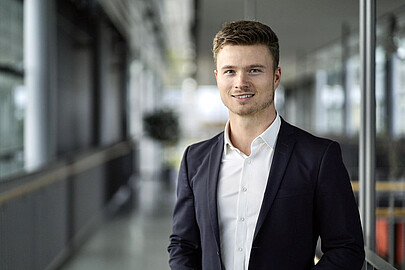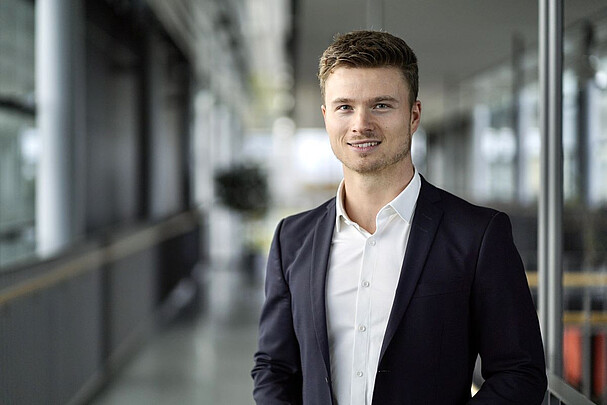The topics listed below are currently available (German). If you are interested, please contact the person mentioned in the announcement using exclusively your student university email address.
Bachelor Thesis Topics
-
Parameter study on the deposition of aluminum oxide for the development of thin insulation layers
Topic AnnouncementPDF, 61 KB
-
Analysing the thermal properties of microheaters for use in atomic sources
Topic AnnouncementPDF, 86 KB
-
Encapsulation and evaluation of UHV packages
Topic AnnouncementPDF, 145 KB
-
Evaluation of a process for the structured metallization of ceramic components
Topic Announcement (2nd page English)PDF, 363 KB
-
Varying topics: Big Data, Artificial Intelligence, Data Analysis, Electronics, Simulation and Sensors
You are interested in exciting and innovative projects in the context of novel sensor technology, electronics development, data acquisition and artificial intelligence?
Are you looking for a thesis with long-term development opportunities, also in the direction of a doctorate degree?
You are fascinated by these possible fields of activity: Sensor data fusion and pre-processing, edge computing, data acquisition, electronics development, data management, AI, sensor development, Internet-of-Things, Python, AWS, data warehouse, SQL databases, data mining, Matlab® & Simulink®, ANSYS®, smart sensors, hardware development, new sensor concepts, FPGA, software sensor technology, simulation, algorithmic optimization methods, particle swarm optimization, greedy algorithms, digital twin, deep learning, data science, big data, EAGLE, embedded systems.
Then get in touch with Daniel Klaas and become part of a young and motivated team. We are interested in a long-term collaboration and offer you the opportunity to apply and develop your knowledge and skills in exciting research and industry projects.
Requirements: Interested, independent students in the field of mechanical engineering, electrical engineering, mechatronics, information technology, (technical) computer science, physics and comparable.
Topic Announcement (German)PDF, 43 KB -
Production and characterisation of electrical insulation layers for use in atom chips
Topic AnnouncementPDF, 61 KB
-
Evaluation and optimization of a PECVD process for the production of insulating layers of Si3N4
Topic Announcement (German)PDF, 192 KB
Student Project Topics
-
Evaluation and optimization of a PECVD process for the production of insulating layers of Si3N4
Topic Announcement (German)PDF, 192 KB
Master Thesis Topics
-
Fabrication of nano structured mirrors from single crystal diamond
Topic AnnouncementPDF, 97 KB
-
Development of hybrid bonding for the 3D integration of microelectronic systems
Topic AnnouncementPDF, 83 KB
-
In-situ characterization of the field emission from individual field emitters through integration of neural network
Topic AnnouncementPDF, 43 KB
-
The influence of the process atmosphere on laser-induced graphitization of polycrystalline diamond layers
Topic AnnouncementPDF, 41 KB
-
Development and characterisation of an opening mechanism of a MEMS atomic source for use in quantum computers
Topic AnnouncementPDF, 87 KB
-
Design, manufacture and evaluation of UHV packages for quantum sensors
Topic AnnouncementPDF, 50 KB
-
Construction of a measuring stand for evaluating the optical and magnetic properties of an atomic chip
Topic Announcement (2nd page English)PDF, 437 KB
Unsolicited Applications
Do you have an idea or are you interested in a specific topic and would like to write a paper on it? We are always open to working on topics with students and are happy to receive unsolicited applications! We mainly offer topics from the two areas of thin film technology and mechanical micromachining and tribology. These areas are described in more detail below. If you have any questions regarding the topics, please direct them to the contacts listed.
The field of thin-film technology at IMPT covers the design and manufacture of microsystems/MEMS (sensors, actuators). The underlying effect of most of these systems is electromagnetism.
-
Design
The initial system design is done by analytical and network-based methods. The detailed design is then carried out using FEM simulations. For this purpose, the multiphysics simulation tool ANSYS® is available, with which simulations e.g. in the fields of structural mechanics and electromagnetics as well as thermal and fluid dynamic simulations can be performed.
-
Actuators
The actuators manufactured at the IMPT use magnetic fields to generate movement. Depending on their operating principle, the actuators can be classified as synchronous, (variable) reluctance, and hybrid actuators. Both linear and rotating micromotors are manufactured, and the use of these magnetic microactuators is being investigated, e.g. in microoptics, the manipulation of magnetic nanoparticles and implantology.
-
Sensors
In addition to sensors based on electromagnetic principles, such as eddy current sensors, strain sensors, and GMR sensors (ultra-thin, for high-temperature applications), research at the IMPT focuses on modular sensors for gentelligent applications, including temperature sensors.
-
Manufacture
For the production of microactuators and sensors a combination of photolithography and electrodeposition is routinely used. Using photolithography, a temporary form of photoresist is created on Si or Al2O3 substrates and filled with functional materials by electrodeposition. As functional materials Cu is used for coils and leads. NiFe45/55, NiFe81/19, CoFe and Ni are used for flow guides. Furthermore, the epoxy resin SU-8™ and polyimide are used as embedding material and material for membranes. As insulation layers of Si3N4 and SiO2 are used, which are produced by PECVD (Plasma Enhanced Chemical Vapor Deposition). For patterning, ion beam etching and lift-off are also used. The production of mechanical components (membranes, bending beams, spring structures...) is done by a combination of photolithography and etching processes. For this purpose dry etching processes (e.g. DRIE, plasma) as well as wet chemical etching processes (e.g. KOH, HF) are available.
Topics in this field may have the following main focus:
- Generation of highly accurate edges and microprofiles
- Optimization of a wafer holder tool for chemical mechanical polishing (CMP)
- Joining of micro components by means of soldering, eutectic and anodic bonding
- Investigation and characterization of tribological coatings
-
Mechanical Micromachining
In the field of mechanical micro-machining, different processes are used. On the one hand, cutting-off and profile grinding processes are carried out for high-precision separation and profiling of micro-components made of ceramics, glass and silicon. On the other hand, nano-grinding and lapping processes are carried out for high-precision surface treatment of brittle-hard materials and the creation of micrographs. Furthermore, processes for the production of surfaces of high quality as well as the planarization of wafer surfaces of material combinations by polishing and chemical-mechanical polishing (CMP) are performed.
-
Microtribology
In the field of microtribology, for example, wear investigations are carried out on a rotary wear measuring stand using the pin-on-disk method for flat microcontact. Furthermore, investigations on microhardness and Young's modulus as well as the representation of (adhesive) friction of thin layers by means of nanoindentation and scratch investigations are carried out. The breaking strength of coatings is determined by means of acoustic emission. Additionally, analyses of friction forces in microcontact are carried out.
Topics in this field may have the following main focuses:
- The fabrication and characterization of microsystems
- The development and optimization of manufacturing processes
- Layer characterizations
- Materials testing

 © IMPT/Petring
© IMPT/Petring
30823 Garbsen

 © IMPT/Petring
© IMPT/Petring

 © IMPT / Fischer
© IMPT / Fischer
30823 Garbsen

 © IMPT / Fischer
© IMPT / Fischer




















